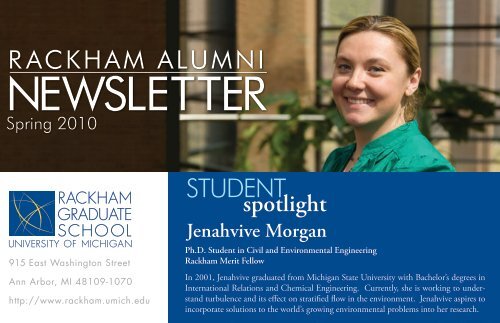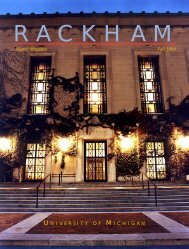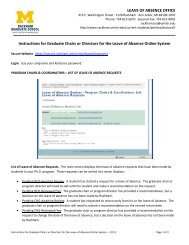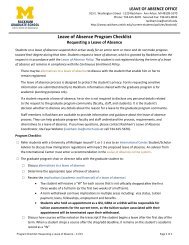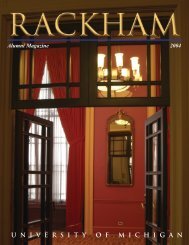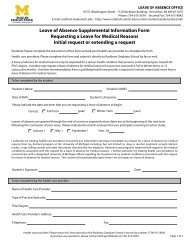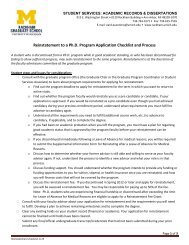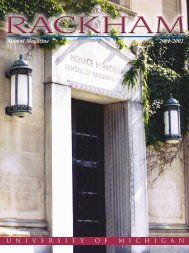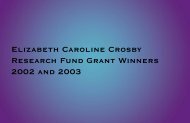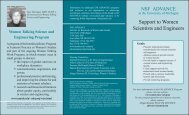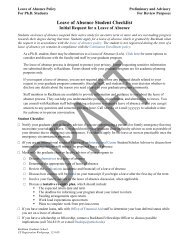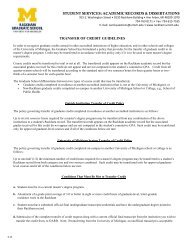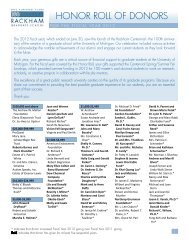NEWSLETTER - Rackham Graduate School - University of Michigan
NEWSLETTER - Rackham Graduate School - University of Michigan
NEWSLETTER - Rackham Graduate School - University of Michigan
- No tags were found...
You also want an ePaper? Increase the reach of your titles
YUMPU automatically turns print PDFs into web optimized ePapers that Google loves.
R ACKHAM ALUMNI<br />
<strong>NEWSLETTER</strong><br />
Spring 2010<br />
915 East Washington Street<br />
Ann Arbor, MI 48109-1070<br />
http://www.rackham.umich.edu<br />
STUDENT<br />
spotlight<br />
Jenahvive Morgan<br />
Ph.D. Student in Civil and Environmental Engineering<br />
<strong>Rackham</strong> Merit Fellow<br />
In 2001, Jenahvive graduated from <strong>Michigan</strong> State <strong>University</strong> with Bachelor’s degrees in<br />
International Relations and Chemical Engineering. Currently, she is working to understand<br />
turbulence and its effect on stratified flow in the environment. Jenahvive aspires to<br />
incorporate solutions to the world’s growing environmental problems into her research.
STUDENT<br />
spotlight<br />
Christina Chang<br />
Ph.D. Student in History <strong>of</strong> Art<br />
<strong>Rackham</strong> Merit Fellowship<br />
Christina was born and raised in Los Angeles,<br />
and received her B.A. in political economy<br />
from UC Berkeley in 2001. Her dissertation<br />
project examines the evolution <strong>of</strong><br />
painting during the 1950s in New York away from the conventional easel-sized<br />
oil painting on canvas, to a far looser conception <strong>of</strong> the form as simply something<br />
that hangs on a nail in the wall. Christina will finish her degree in 2010.<br />
Mesmin Destin<br />
Ph.D. Student in Psychology<br />
<strong>Rackham</strong> Predoctoral Fellowship<br />
Mesmin earned his B.A. from Northwestern<br />
<strong>University</strong> in Psychology and Sociology.<br />
He plans to complete his dissertation<br />
in 2010, which explores specific psychological<br />
mechanisms that drive the association<br />
between financial resources and outcomes<br />
for students from middle-school into early<br />
adulthood. Through a series <strong>of</strong> nationallyrepresentative<br />
data analyses and classroom<br />
field experiments, Mesmin aims to highlight how the perception <strong>of</strong> economic<br />
circumstances and possibilities can influence the goals and behaviors <strong>of</strong> young<br />
people. He plans to produce research that carries significance within academic,<br />
policy, and local community domains.<br />
Zachary Dalebroux<br />
Ph.D. Student in Microbiology<br />
and Immunology<br />
<strong>Rackham</strong> Predoctoral Fellowship<br />
Zachary’s thesis focuses on how Legionella<br />
pneumophila, a Gram-negative bacterial<br />
pathogen and causative agent <strong>of</strong> an acute<br />
pneumonia known as Legionnaire’s Disease,<br />
utilizes a general stress response pathway to<br />
coordinate transmission between white blood<br />
cells. Specifically, he is studying how the<br />
bacterium employs the molecule guanosine tetraphosphate, or ppGpp, and the<br />
transcription factor DksA, to control expression <strong>of</strong> genes critical for intracellular<br />
survival. Zachary will graduate in April 2010 and join the laboratory <strong>of</strong> Dr. Sam<br />
Miller at the <strong>University</strong> <strong>of</strong> Washington in Seattle for his post-doctoral studies.<br />
The Regents <strong>of</strong> the <strong>University</strong> <strong>of</strong> <strong>Michigan</strong><br />
Julia Donovan Darlow, Ann Arbor<br />
Laurence B. Deitch, Bingham Farms<br />
Denise Illitch, Bingham Farms<br />
Olivia P. Maynard, Goodrich<br />
Andrea Fischer Newman, Ann Arbor<br />
Andrew C. Richner, Grosse Pointe Park<br />
S. Martin Taylor, Grosse Pointe Farms<br />
Katherine E. White, Ann Arbor<br />
Mary Sue Coleman (ex <strong>of</strong>ficio)<br />
Nondiscrimination Policy Statement<br />
The <strong>University</strong> <strong>of</strong> <strong>Michigan</strong>, as an equal opportunity/affirmative<br />
action employer, complies with all<br />
applicable federal and state laws regarding nondiscrimination<br />
and affirmative action. The <strong>University</strong><br />
<strong>of</strong> <strong>Michigan</strong> is committed to a policy <strong>of</strong> equal opportunity<br />
for all persons and does not discriminate<br />
on the basis <strong>of</strong> race, color, national origin, age,<br />
marital status, sex, sexual orientation, gender identity,<br />
gender expression, disability, religion, height,<br />
weight, or veteran status in employment, educational<br />
programs and activities, and admissions. Inquiries<br />
or complaints may be addressed to the Senior<br />
Director for Institutional Equity, and Title IX/Section<br />
504/ADA Coordinator, Office <strong>of</strong> Institutional<br />
Equity, 2072 Administrative Services Building, Ann<br />
Arbor, <strong>Michigan</strong> 48109-1432, 734-763-0235, TTY<br />
734-647-1388. For other <strong>University</strong> <strong>of</strong> <strong>Michigan</strong><br />
information call 734-764-1817.<br />
would<br />
you<br />
like to<br />
save<br />
a tree<br />
In an effort to streamline costs and be good stewards<br />
<strong>of</strong> the environment, we are now <strong>of</strong>fering the<br />
<strong>Rackham</strong> Alumni Newsletter as an email message.<br />
If you prefer to receive this newsletter electronically,<br />
please go to:<br />
http://www.rackham.umich.edu/alumni/<br />
Click on “Change <strong>of</strong> Address” and follow the instructions<br />
to provide your email address.<br />
Thank you!
FEATURE<br />
<strong>School</strong> <strong>of</strong> Information<br />
Prepares Librarians for a<br />
Brave New World<br />
By Jeff Mortimer<br />
photo by D.C. Goings<br />
<strong>Rackham</strong> <strong>Graduate</strong> <strong>School</strong> promotes excellence in graduate education<br />
for students in 104 doctoral and 90 master’s programs.<br />
Alumnae and library pr<strong>of</strong>essionals Josie Parker and Karen Jordan<br />
spoke recently with Ph.D. student Chris Leeder about what has<br />
changed, and what hasn’t, in the information science program.<br />
These can be scary times for anyone<br />
in the information field, as technological<br />
earthquakes rock centuries-old<br />
notions about the acquisition, storage<br />
and dissemination <strong>of</strong> knowledge.<br />
Libraries are on the front lines <strong>of</strong> this<br />
upheaval, even as equally scary economic<br />
times have spiked demand for<br />
their services.<br />
In Josie Parker’s opinion, this is just<br />
what her education in the <strong>University</strong><br />
<strong>of</strong> <strong>Michigan</strong> <strong>School</strong> <strong>of</strong> Information<br />
prepared her for: not preserving the<br />
past or even coping with the present,<br />
but facing the future.<br />
“What the school taught me was to<br />
take these kinds <strong>of</strong> challenges head-on,<br />
to not flinch, to be brave, to ask questions<br />
that people aren’t used to librarians<br />
asking,” says Parker, who earned her master’s in 1996 and has<br />
been Director <strong>of</strong> the Ann Arbor District Library since 2002. “U-M<br />
gave me a lot <strong>of</strong> courage and taught me how to use it.”<br />
Left to right: Josie Parker, Chris Leeder, Karen Jordan<br />
Parker was joined in a discussion <strong>of</strong> the future <strong>of</strong> libraries by fellow<br />
SI alumna Karen Jordan, the <strong>University</strong> Library’s Exhibits and Outreach<br />
Librarian, and Chris Leeder, a first-year doctoral student in<br />
SI. Although their associations with the <strong>School</strong> span three and a half<br />
decades – it was still known as the <strong>School</strong> <strong>of</strong> Library Science when<br />
Jordan got her master’s in 1975 – their perceptions <strong>of</strong> its strengths<br />
are remarkably consistent.<br />
“They didn’t teach you to be limited,” says Jordan. “I think that’s<br />
why so many <strong>Michigan</strong> alumni have reached great levels <strong>of</strong> responsibility<br />
in librarianship around the country. They may not have been<br />
trained in the specific skills for these jobs, but they were taught how<br />
to learn and how to think, so they can embrace those skills. The basic<br />
value <strong>of</strong> librarianship is access – providing information to people,<br />
organizing it, making it available and useful, and managing all that<br />
– and the technology is just another way <strong>of</strong> doing those things.”<br />
When Parker was at U-M, she was one <strong>of</strong> a team <strong>of</strong> 35 graduate students<br />
that constructed the Internet Public Library. Now Leeder is going<br />
to U-M in the midst <strong>of</strong> the <strong>University</strong>’s historic partnership with<br />
Google, Inc., to digitize the entire collection <strong>of</strong> the <strong>University</strong> Library.<br />
Begun in 2005, the project is expected to be completed in the<br />
summer <strong>of</strong> 2011, when all seven million bound volumes will be<br />
searchable online. Users will be able to access the full text <strong>of</strong> books<br />
that are out <strong>of</strong> copyright or in the public domain, and snippets <strong>of</strong><br />
those that remain in copyright.<br />
Although Google has similar partnerships with Harvard and other<br />
universities, U-M is the premier testing site for Google’s non-destructive<br />
scanning technology and digitization workflow, and was<br />
the first site to implement such technology.<br />
“If you’re in graduate school at <strong>Michigan</strong><br />
right now, being involved in anything<br />
surrounding the Google book project is<br />
added value,” says Parker. “You’re going to<br />
have opportunities that you could not buy<br />
and are not covered by tuition.”<br />
Leeder sees some other attributes <strong>of</strong> the<br />
program as priceless, too. “The contacts<br />
that are available here, and the networks,<br />
add a lot to the education,” he says. “And<br />
they’re very strong on people doing their independent<br />
research, publishing articles, and<br />
attending conferences. You get pr<strong>of</strong>essional<br />
experience and exposure and start developing<br />
your career while you’re a student.”<br />
It’s important to stay light on one’s feet,<br />
too, as the ground can shift <strong>of</strong>ten and pr<strong>of</strong>oundly.<br />
The skills whose value will endure<br />
are grounded in the core mission <strong>of</strong> libraries,<br />
rather than a particular delivery system.<br />
“It’s learning a skill set you can apply<br />
to many venues, many types <strong>of</strong> tools, many types <strong>of</strong> systems,” says<br />
Leeder. “It comes down to basic principles.”<br />
That’s what Parker likes to hear from someone preparing to be a leader<br />
in the pr<strong>of</strong>ession. In 1992, long before she became its director, the<br />
Ann Arbor Library removed its card catalog, prompting predictable<br />
but understandable protests. The <strong>University</strong> Library followed suit late<br />
last winter; the last item had been added to its card catalog in 1988.<br />
“The next generation will have to lead us into a time when people<br />
won’t be complaining about where did the card catalog go, they’ll be<br />
complaining about where did the shelves go,” she says. “My attitude<br />
about that comes from what I did at the <strong>University</strong> <strong>of</strong> <strong>Michigan</strong>:<br />
make the best out <strong>of</strong> it and own it, turn it into something positive. I<br />
don’t want you to have to go to a museum to find out what a public<br />
library was, but if we don’t accept that shelves will go away and the<br />
book will change, if the library remains only about the book and not<br />
about the community it serves, then the library goes away.”
AWARDS<br />
Distinguished Dissertation<br />
Awards <strong>of</strong> 2009<br />
While all graduating <strong>Rackham</strong> students produce excellent dissertations,<br />
some students write dissertations that are truly exceptional<br />
for the high quality <strong>of</strong> their scholarship and for the<br />
significance and interest <strong>of</strong> their findings. We recognize these<br />
exceptional dissertations with the ProQuest Distinguished Dissertation<br />
Award.<br />
Dissertations produced in 2009 are nominated for the award by<br />
<strong>University</strong> faculty who have served as chairs <strong>of</strong> dissertation committees<br />
<strong>of</strong> outstanding students. The nominations are then read<br />
by a review panel composed <strong>of</strong> members <strong>of</strong> the <strong>Michigan</strong> Society<br />
<strong>of</strong> Fellows, with assistance from other members <strong>of</strong> the <strong>University</strong><br />
faculty and research community.<br />
The awards are co-sponsored by ProQuest, which publishes 35,000<br />
dissertations annually, including more than 800 by <strong>University</strong> <strong>of</strong><br />
<strong>Michigan</strong> authors. We are delighted to partner with ProQuest in<br />
celebrating the remarkable achievements <strong>of</strong> these promising young<br />
scholars. The awards will be presented at a special ceremony to be<br />
held at the <strong>Rackham</strong> Building on April 29, 2010.<br />
NEWS<br />
The award recipients are:<br />
Eric W. Groenendyk, Political Science<br />
The Motivated Partisan: A Dual Motivations Theory <strong>of</strong><br />
Partisan Change and Stability<br />
Blair Allen Johnston, Music Theory<br />
Harmony and Climax in the Late Works <strong>of</strong><br />
Sergei Rachmanin<strong>of</strong>f<br />
<strong>University</strong> <strong>Graduate</strong> Exercises on April 30<br />
Jasper E. Kok, Atmospheric, Oceanic, and Space Science<br />
Understanding Wind-Blown Sand and the Electrification <strong>of</strong><br />
Granular Systems<br />
Eranda Nikolla, Chemical Engineering<br />
Combined Experimental/Theoretical Approach Toward the<br />
Development <strong>of</strong> Carbon Tolerant Electrocatalysts for Solid<br />
Oxide Fuel Cell Anodes<br />
Howard L. M. Nye, Philosophy<br />
Ethics, Fitting Attitudes, and Practical Reason: A Theory <strong>of</strong><br />
Normative Facts<br />
Robert Grant Rowe, Cellular and Molecular Biology<br />
Differential Regulation <strong>of</strong> Two and Three-Dimensional<br />
Cell Function<br />
Nathalie E. Williams, Sociology<br />
Living with Conflict: The Effect <strong>of</strong> Community Organizations,<br />
Economic Assets, and Mass Media Consumption on<br />
Migration During Armed Conflict<br />
Ruth E. Zielinski, Nursing<br />
Private Places—Private Shame: Women’s Genital Body Image<br />
and Sexual Health<br />
<strong>University</strong> <strong>Graduate</strong> Exercises, to be held on Friday, April 30, is the commencement ceremony for all master’s and doctoral graduates<br />
and candidates who receive their degrees through the <strong>Rackham</strong> <strong>Graduate</strong> <strong>School</strong>. A formal procession <strong>of</strong> faculty and graduates in full<br />
academic garb moves from the <strong>Rackham</strong> Building to Hill Auditorium, where commencement is held. Afterwards graduates and their<br />
families enjoy a reception on Ingalls Mall. It’s the <strong>University</strong> <strong>of</strong> <strong>Michigan</strong> at its ceremonial, celebratory best.<br />
The speaker at this year’s <strong>University</strong> <strong>Graduate</strong> Exercises will be Charles M.<br />
Vest. Dr. Vest earned a B.S. in mechanical engineering from West Virginia<br />
<strong>University</strong> in 1963, and M.S.E. and Ph.D. degrees in mechanical engineering<br />
from the <strong>University</strong> <strong>of</strong> <strong>Michigan</strong> in 1964 and 1967 respectively.<br />
He joined the U-M faculty in 1968 and was appointed associate dean<br />
<strong>of</strong> engineering from 1981-86, dean <strong>of</strong> engineering from 1986-89, and<br />
provost and vice president for academic affairs in 1989. In 1990 he became<br />
president <strong>of</strong> MIT and served until 2004 when he became pr<strong>of</strong>essor<br />
and president emeritus. In July 2007 he was elected president <strong>of</strong> the U.S.<br />
National Academy <strong>of</strong> Engineering. He has received honorary doctoral degrees<br />
from ten universities, and was awarded the 2006 National Medal <strong>of</strong><br />
Technology by President Bush.


